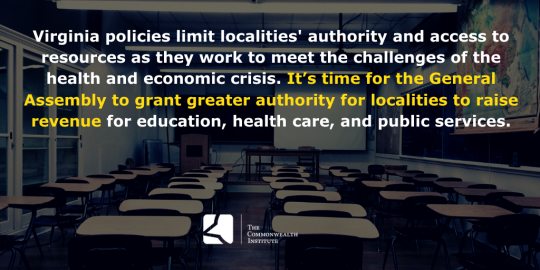August 11, 2020
State Can Build on Recent Improvements and Provide Greater Local Revenue Authority
Nationally, state and local governments are on the front lines of addressing the current health and economic crises. In addition to responding to public health needs during a pandemic and carrying out evolving responsibilities related to K-12 education, local officials in Virginia have also established new programs through specific federal aid to assist families and small businesses that are struggling. At the same time, local governments in particular are facing enormous revenue challenges to maintain support for core public services. Under a new law signed earlier this year, the state has lifted some of the strict limits on a county’s ability to raise revenues. The General Assembly should consider further expanding local flexibility to manage their budgets, including authority relating to new revenues and tax relief.
Before the pandemic, spending on health and human services and education made up over half of total local governments’ operating spending in Virginia. [Note: This excludes local spending where the source of funding is state or federal dollars, as well as capital- and debt-related spending.] The effects of COVID-19 are likely placing even greater demands on local services. In the near term, federal and state actions will provide some financial assistance to partly relieve these pressures. For example, the Northam administration has provided local governments with about $1.3 billion in funds from the federal CARES Act. Localities can use these funds through Dec. 30 for “necessary expenditures” to respond to the COVID-19 health crisis that were not included in their previously adopted budgets. The CARES Act also provided funding for K-12 schools, though likely far short of what is needed.
For localities to meet the needs of their communities, including once federal aid expires, they will need greater revenue authority so that each community can determine the best mix of revenues for their situation.

Because of a U.S. legal concept commonly referred to as “Dillon’s Rule,” Virginia’s localities lack true home rule and have only the powers expressly granted to them by the Virginia General Assembly. In terms of revenues, that means localities in Virginia either do not have access to certain types of revenues or must adhere to state-established rates when levying many of the taxes that are permitted. For instance, the local sales tax is generally limited to 1%. Significantly, the state also does not permit any localities to levy a local income tax. Virginia’s local governments, especially counties, are mostly reliant on real and personal property taxes.
Under new flexibility in state law, all counties in the state will now be able to levy taxes on cigarettes and admission fees to events (e.g., movie, theater, and sporting events tickets) and have greater authority to levy meals taxes and taxes on temporary lodging such as hotels, known as transient occupancy. The provisions related to cigarette and transient occupancy taxing authority will take effect next year. This law will likely help counties to diversify their revenues streams and reduce their reliance on property taxes. However, the law also imposes a new cap on cigarette taxes, freezing existing local cigarette tax rates that are above the new cap. As of 2017, there were 15 cities and 10 towns with local cigarette tax rates at or above the new cap of 40 cents per pack, according to the Weldon Cooper Center’s annual publication on local tax rates.
Until Virginia also grants additional revenue and tax relief authority to localities, local taxes in the state will remain regressive. That means families with low and moderate incomes pay a larger share of their incomes in local taxes than families with high incomes. And although the state allows income-based real property tax relief for select categories of property owners, such as elderly or disabled homeowners, it prohibits local governments from providing income-based tax relief more broadly.
Limits on other revenue sources also contribute to reliance on court fines and fees, particularly in parts of the state where a higher share of the population is Black. Fines and fees, as well as associated interest and debt, can create “poverty traps” that exacerbate existing inequities by race and income. In contrast, local income taxes—which the state currently does not allow cities and counties to levy—and local income-based tax relief would shift local revenue systems in a progressive direction and improve equity. Local governments collect income or payroll taxes in 13 states.
State aid, not including federal pass-thru dollars, represented 32% and 30% of revenues for cities and counties, respectively, in the budget year that ended June 30, 2019. Without greater flexibility and revenue authority, localities, especially those with smaller property tax bases, need state aid to meet a large share of their budgets. During the aftermath of the Great Recession, lawmakers cut state funding for localities. Many cuts linger today, such as those related to K-12 education, where state funding prior to the pandemic remained down 8% per student compared to 2009 (adjusted for inflation).
Local governments are responding to the current moment while still maintaining core services. While new flexibilities and state and federal aid will provide budget support, localities will still face significant challenges in the years ahead. Until the General Assembly grants localities additional authority to raise necessary resources, local governments will continue to face familiar constraints. It’s up to state lawmakers to provide new options and tools.
Category:
Budget & Revenue
